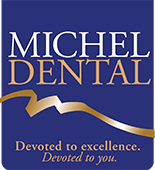For the past few months, you’ve been exhausted. You’re sleeping a full eight hours at night – and sometimes even longer – but no amount of rest seems to make you feel refreshed when you wake up. And lately, you’ve even been waking up with migraines…and that’s on top of getting up frequently during the night to use the bathroom. The final straw, though, was when your partner noticed that you stopped breathing while you were out a couple nights ago. Something is definitely wrong, but when you work with the team at Michel Dental, they’re able to diagnose you with sleep apnea in Topeka using a noninvasive technique at a regular office visit. In this post, learn all about the signs and symptoms of this sleep disorder – and how Dr. Michael Michel can help.
What Is Sleep Apnea?
Before Dr. Michel expands on the signs and symptoms of this condition, he likes to define what sleep apnea in Silver Lake actually is. Obstructive sleep apnea is the most common form of this disorder and is the second most prevalent sleep issue behind insomnia. With OSA, when you sleep, your tongue and lower jaw relax, sliding against the back of your throat and preventing you from breathing correctly.
Since your body knows you’re not getting the oxygen you need, you’ll wake up slightly. Your brain will only make you awake enough to start breathing properly again, but you won’t be conscious enough to remember it. These “micro-arousals” can happen hundreds of times a night – leaving you exhausted, but without a clear answer as to why.
What Are The Signs & Symptoms Of Sleep Apnea?
Although snoring is the most common symptom associated with this disorder, you don’t have to snore to have sleep apnea. The other prevalent signs include the following:
- Gaps or elongated pauses in breathing when you sleep – usually noticed by your partner.
- Waking up snorting or gasping for air.
- Waking up with an asthma attack.
- Waking up to urinate – this happens because the body tries to lower your heightened blood pressure by removing fluids from the body.
- Morning migraines or headaches.
- Excessive daytime sleepiness, even after sleeping 8 or more hours.
- Falling asleep or feeling sleepy while driving.
- Craving carbs and sweets for energy.
- Weight gain.
- Depression, irritability, forgetfulness, and trouble concentrating.
- Decreased interest in sex.
What Can I Do If I Think I Have Sleep Apnea?
If the symptoms in the list above sound like you, take this sleep apnea quiz and give our office a call. We can help you through the entire process of diagnosis and treatment. If you do have this disorder, we can help alleviate the symptoms – and the serious health problems from untreated sleep apnea – by fitting you for a custom oral appliance. Resembling a mouthguard, this comfortable device will gently shift your tongue and lower jaw forward, opening your airway and allowing you to breathe freely while you sleep. This type of dental treatment is remarkably effective and works well in about 80% of patients – custom oral appliance therapy (COAT) can even augment or replace an uncomfortable and cumbersome CPAP machine.
If you’re ready to reduce your risk of high blood pressure, stroke, heart attack, and to start sleeping like a baby again, schedule your appointment with Michel Dental today!
